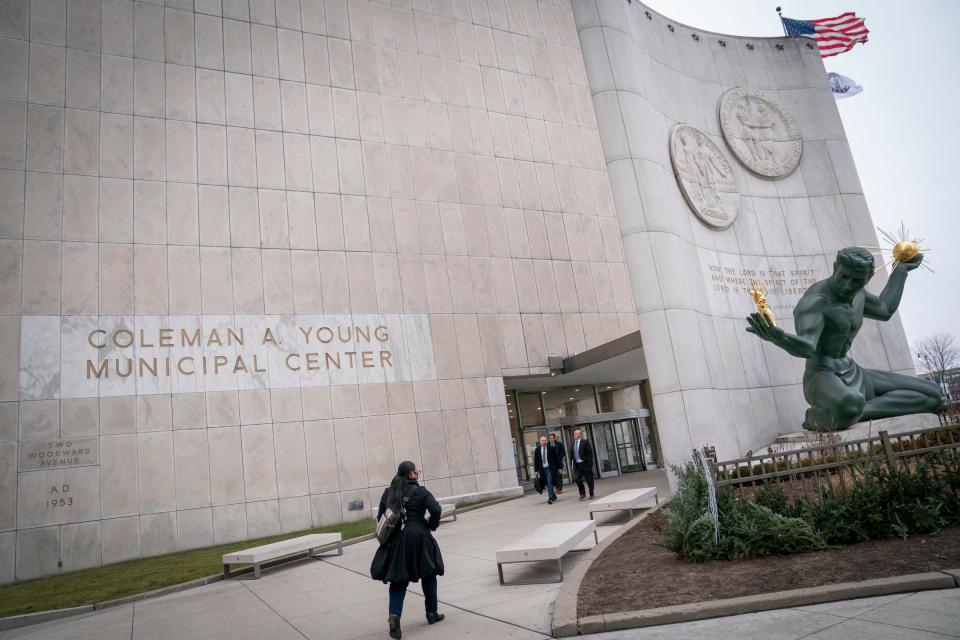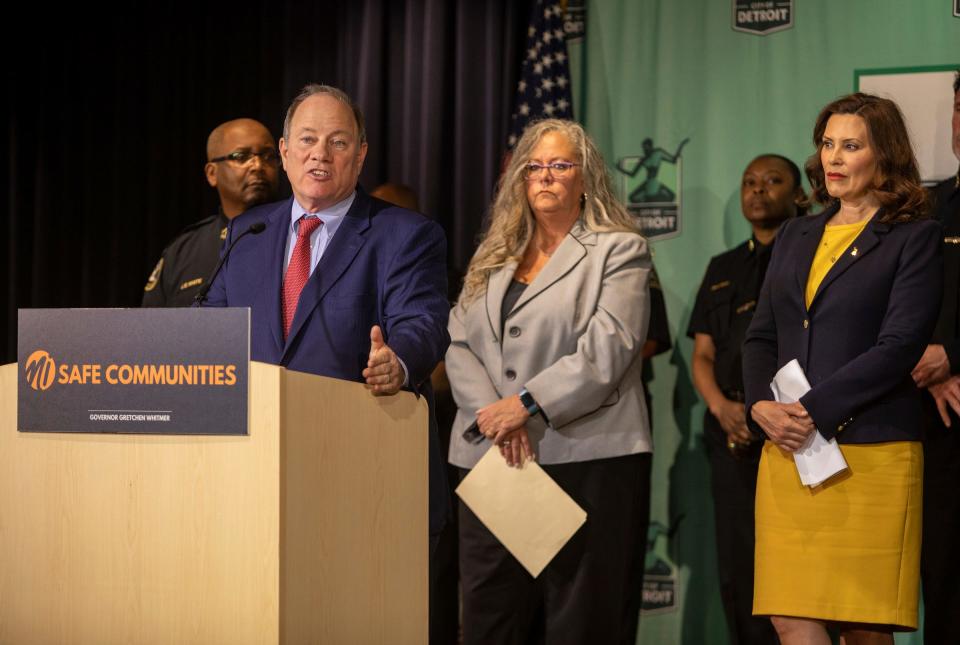Detroit's 40-year reign as nation's largest majority-Black city may be over
- Oops!Something went wrong.Please try again later.
Mayor Mike Duggan blasted recent census estimates for 2022 that show another year of population loss in Detroit. Behind the numbers lies another shift: Detroit appears to no longer stand as the nation's largest majority-Black city.
Since 1980, Detroit's borders have encompassed a larger population than other mostly Black cities in the U.S., according to the decennial census, the once-a-decade count of all people in the country. But new population data released in the years between each decennial census show a possible end to Detroit's 40-year reign as America's biggest majority-Black city.
Population estimates released by the U.S. Census Bureau last Thursday show that at 621,056 residents, Memphis has a larger population than Detroit's 620,376 as of July 1, 2022. The most recent census survey data showed both cities were majority-Black cities with Detroit home to a 76% Black population and Memphis to a 63% Black population as of 2021.
Pair the latest racial demographic and population numbers, and the census estimates show Memphis — not Detroit — is now the nation's largest majority-Black city by an estimated 680 residents.
But experts warn to interpret the numbers with caution. They emphasize that the population estimates are just that, estimates. Not to mention the tight margin separating the two cities. Meanwhile, Detroit successfully leveled a challenge to the last decennial census that led to the addition of 1,478 more people to the total count, according to the Duggan administration official overseeing the city's census challenges. And the city could see revisions to the population estimates resulting from additional challenges Duggan's office says it filed last week.

"Every estimate has to be taken with several grains of salt," said demographer Kurt Metzger, who founded Data Driven Detroit, which provides data analysis of Detroit and its surrounding region. "We may be bigger than Memphis right now."
Even if the estimates accurately reflect Memphis had a larger population than Detroit last year, the change may ultimately be an annual blip rather than the start of a long-term trend.
"I would predict that we will be bigger than Memphis next year," Metzger said.
But more than any shift from Detroit to Memphis as the largest majority-Black city in the U.S., those fighting for Detroit's future say it is the specter of continued population loss signaled by the latest census estimate that spells trouble.
More: Duggan unleashes on Twitter, calls US Census Bureau 'clown show' over population numbers
More: Whitmer: Michigan's future depends on diversifying state economy
Some see change as mostly symbolic, but call Detroit population loss consequential
Civil rights activist Edith Lee-Payne, a 71-year-old from Detroit, questioned Detroit losing its status as the nation's largest majority-Black city is anything more than symbolic. "Actually, I don't think it has any real-world implications," she said.
Terrell Garner, 43, who was born and raised in the city, said the label does not affect him. But the two Detroiters stressed that what appears to be driving the shift — population loss — has consequences. As residents leave, dollars follow.
It's why filling out the census is so crucial for cities like Detroit. "It's just as important as voting," Garner said. "I do understand the ramifications where if we have 1 million people in the city and they only show 750,000, there's a lot of federal dollars we're missing out on," Garner said. "It affects us greatly when they don't fill out the census."
Detroit Future City CEO Anika Goss said "there's actual money that comes" with population losses in cities.
"There's a financial loss in terms of your federal funds allocation that you receive and how resources are organized even from the state. So, there are real implications to that," she said.
Detroit Future City — a nonprofit organization focused on developing research and strategies for the city's revitalization — has focused on increasing the number of Black middle-class households in the city to help grow the city's population and increase its tax base.
In the census estimates, Goss sees an opportunity: a chance for Detroit and Memphis to learn from one another. "I think that the challenges that they are having in population loss are very similar and align with Detroit and we should be working closer with them on strategies," she said.
In terms of land area, Memphis is more than twice the size of Detroit. But Detroit's steeper population loss since the end of the 20th century has prompted acute concerns about the city's declining density.
Adolph Mongo, a political consultant who worked for former Detroit Mayor Coleman Young, said to attract residents to Detroit, the city needs to focus on preventing crime and building a stronger school and retail network to encourage those who are leaving the city to stay.
Detroit stands out nationally for share of its Black population
Some big cities in the U.S. have more Black residents than Detroit such as Chicago or New York. But in those two cities, Black residents make up a smaller share of their total population compared to Detroit. On this measure — the share of Black residents in a city — Detroit, with Black residents accounting for more than three-quarters of the city's population, looks more like Jackson, Mississippi.
"Black people are the supermajority here in Detroit," said Goss.
Still, the 2020 census showed the number of Black residents in Detroit fell over the previous decade while the city’s Hispanic, white and Asian populations grew. Demographics in the city have shifted as Detroit has seen an overall decline in its population, according to census data.
Detroit lost a quarter of its residents between 2000 and 2010. And while the 2020 census showed population loss in the city slowing down, it showed the city continued to shed residents.
The politics of population
Duggan has staked his political career, in part, on reversing that trend. Duggan said repeatedly during his first term that he should be judged on whether Detroit saw a population increase during his tenure. But census population estimates show Detroit has lost population every year Duggan has served as mayor.
Last year, Duggan filed a lawsuit against the U.S. Census Bureau claiming an undercount of Detroit’s population. After the release Thursday of the 2022 population estimates showing another consecutive loss for the city, Duggan again attacked the federal agency, calling it "a complete national clown show," in a tweet.

Mongo, who said he does not often agree with Duggan, concurred with the mayor's latest statement. The longtime consultant was part of Young's legal effort to re-count Detroit's population in 1990 after the Census Bureau initially dropped it below 1 million. The former mayor rallied hundreds of volunteers to knock on doors, which forced the bureau to adjust the numbers.
Detroit's population trends caught in the local fight over the data could reverberate nationally.
The 2022 midterm election marked the first time in nearly 70 years that Detroit ended up with no Black representation in Congress, a result that stood out, in part, because of its status as the nation's largest majority-Black city.
Clara Hendrickson fact-checks Michigan issues and politics as a corps member with Report for America, an initiative of The GroundTruth Project. Make a tax-deductible contribution to support her work at bit.ly/freepRFA. Contact her at chendrickson@freepress.com or 313-296-5743. Follow her on Twitter @clarajanehen.
Contact Kristi Tanner: ktanner@freepress.com. Follow her on Twitter: @midatalove.
Dana Afana is the Detroit city hall reporter for the Free Press. Contact Dana: dafana@freepress.com or 313-635-3491. Follow her on Twitter: @DanaAfana.
This article originally appeared on Detroit Free Press: Detroit may no longer be largest majority-Black city in US

